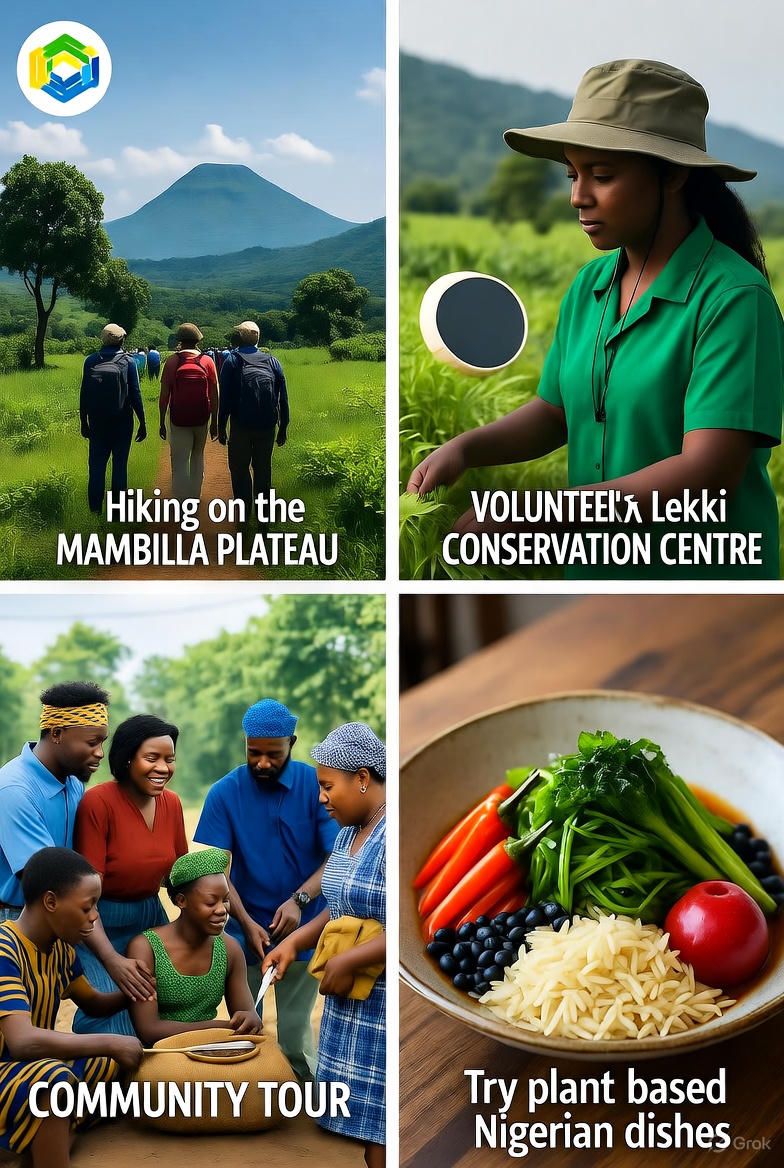How to Travel Sustainably in Nigeria (2025 Guide)
How To Travel Sustainably In Nigeria — Where To Find Eco-Resorts, Strong Connectivity, Affordable Lodging, And Visa Rules (2025 Guide)
So, you want to explore Nigeria without hurting the planet (or your wallet)? 🌍
Good call! Sustainable travel in 2025 isn’t just a trend, it’s how smart travelers explore responsibly while still having the time of their lives. Nigeria, with its stunning beaches, rainforests, and bustling cities, is a great place to start.
This guide breaks down how to travel sustainably in Nigeria, where to stay, how to stay connected, and what to know about visas all in one smooth read.
🌿 What Is Sustainable Travel (and Why It Matters)?
Sustainable travel means exploring new places without harming local communities or the environment. It’s all about:
-
Reducing waste and pollution
-
Supporting local businesses
-
Using eco-friendly transportation
-
Staying in green or community-run lodges
In Nigeria, this could mean choosing an eco-resort in Obudu, buying souvenirs from local artisans in Abeokuta, or booking a shared car trip instead of a private ride.
🏡 Where To Find Eco-Resorts And Green Lodgings In Nigeria
Nigeria is slowly catching up with the eco-tourism movement, and that’s great news for conscious travelers.
Here are some of the most talked-about eco-resorts and lodges:
1. Obudu Mountain Resort (Cross River)
Tucked high in the mountains, this resort offers clean air, lush forests, and natural pools. They’ve introduced eco-initiatives like solar power and reduced plastic use. Perfect for travelers who love nature, hiking, and stunning views.
2. Epe Resort & Spa (Lagos)
A luxury-meets-sustainability experience. Epe Resort sources ingredients from local farmers, limits single-use plastics, and supports the local community.
3. Yankari Game Reserve Eco-Lodges (Bauchi)
Stay close to wildlife while respecting their habitat. These lodges run partly on solar energy and encourage guests to minimize waste.
4. Whispering Palms Resort (Badagry)
Known for its serene environment and eco-friendly practices, it’s ideal for couples or solo travelers looking for peace and good vibes.
5. Green Legacy Resort (Abeokuta)
A good choice if you’re after sustainability with a dash of comfort locally sourced materials, energy-saving lights, and waste-reduction programs.
💡 Pro Tip: Check for “eco-certified” or “green travel” badges when booking on platforms like Booking.com’s Sustainable Travel section or Airbnb Green Stays.
📶 Where To Get Strong Connectivity While Traveling In Nigeria

Let’s be real — no one likes slow Wi-Fi, especially if you’re uploading travel vlogs or managing remote work.
Here’s where you’ll find strong connectivity:
-
Lagos, Abuja, and Port Harcourt: Best 5G coverage from MTN, Airtel, and Glo.
-
Obudu and Jos: Coverage is patchy, so buy a local SIM with data and keep a power bank handy.
-
Coastal areas (like Calabar or Badagry): MTN and Airtel perform better here.
📱 Tip: Download offline maps (Google Maps or Maps.me) and use WhatsApp or Telegram for messaging — they’re data-efficient even in low-signal zones.
💰 Affordable And Sustainable Lodging Tips
Traveling sustainably doesn’t mean breaking the bank. Here’s how to stay green and save cash:
-
Book early: Prices soar during festive periods (December–January).
-
Use budget platforms: Try Travelstart Nigeria or Wakanow for local flight + lodge bundles.
-
Stay in local guesthouses: Many family-run lodgings are cleaner, cheaper, and support the local economy.
-
Cook your meals: If your lodge allows it, buy local produce fresh, tasty, and eco-friendly!
-
Use refillable water bottles and avoid single-use plastics.
✈️ Visa And Travel Rules For 2025
Whether you’re a Nigerian exploring your country or an international visitor, here’s what you should know:
For Nigerians Traveling Locally
No visa needed (of course!). But carry your national ID or passport for domestic flights or lodge check-ins.
For Foreign Travelers Visiting Nigeria
-
Visa on Arrival (VoA): Available for travelers from select countries.
-
E-Visa System (2025 update): Nigeria has expanded its online visa portal apply 2–3 weeks ahead.
-
Yellow Fever Card: Still mandatory at entry points.
-
Eco-Tourism Visa: Discussions are underway for a new visa category promoting sustainable travel.
🛂 Tip: Always confirm current requirements from official Nigerian immigration sources or your embassy before you travel.
🚗 How To Travel Sustainably Around Nigeria
Getting around can be half the adventure. Here’s how to stay eco-friendly while exploring:
-
Take shared transport: Buses like God Is Good Motors or Peace Mass Transit reduce carbon emissions.
-
Carpool: Apps like BlaBlaCar are expanding in Africa.
-
Use electric or hybrid rides: Lagos and Abuja are slowly introducing EV taxis book them when possible.
-
Walk or bike for short distances in cities like Lagos Island, Abeokuta, or Calabar.
🌱 Sustainable Travel Activities In Nigeria

Here are a few eco-friendly experiences worth trying in 2025:
-
Hike the Mambilla Plateau breathtaking views with cool weather.
-
Volunteer at wildlife centers like the Lekki Conservation Centre.
-
Join community tours that highlight local artisans or farmers.
-
Try plant-based Nigerian dishes like yam porridge with vegetables or coconut rice.
-
Shop locally instead of buying imported souvenirs.
🌍 Why Sustainable Travel Matters In Nigeria (2025 Insight)
Nigeria faces challenges like deforestation, plastic waste, and over-tourism in popular areas. But every eco-friendly traveler makes a difference. According to the UN World Tourism Organization (UNWTO), sustainable travel can increase local income by 30% when tourists spend with small, community-run businesses.
So your next eco-stay or plastic-free trip actually supports families, preserves culture, and keeps nature clean for future travelers.
🧭 Quick Sustainable Travel Checklist
✅ Pack reusable bottles and cutlery
✅ Support local restaurants and artisans
✅ Choose lodgings with solar or recycling programs
✅ Respect wildlife and natural areas
✅ Offset your carbon emissions (try myclimate.org)
📚 Internal & External Links
Internal links (suggested):
-
How to Travel on a Budget in 2025
-
Top 10 Tourist Spots in Nigeria You Shouldn’t Miss
-
Best Times to Visit Lagos for Affordable Fun
External links (credible sources):
❓FAQs About Traveling Sustainably In Nigeria
1. What is the best time to travel sustainably in Nigeria?
Between November and March the dry season means smoother roads and better access to eco-resorts.
2. Are there eco-resorts in northern Nigeria?
Yes! Try Yankari Game Reserve or Gashaka-Gumti National Park lodges both are eco-focused and community supported.
3. How can I reduce plastic use while traveling?
Carry your own water bottle and bamboo cutlery. Many resorts now have refill stations.
4. Is Wi-Fi strong in eco-resorts?
It varies. In Lagos and Abeokuta, yes. In Obudu or Cross River, it can be spotty — mobile data is more reliable.
5. Do I need travel insurance for eco-tourism in Nigeria?
Yes, it’s always smart. Look for one that covers adventure and eco activities.
🧳 Final Thoughts: Your Sustainable Journey Starts Now
Traveling sustainably in Nigeria isn’t about perfection it’s about small, mindful choices that add up. Whether it’s picking an eco-resort, supporting a local artist, or sharing rides, your actions shape the future of tourism.
So pack light, travel smart, and explore Nigeria the green way 🌱💚.
Share your thoughts in the comments have you visited any eco-friendly spots in Nigeria yet?



